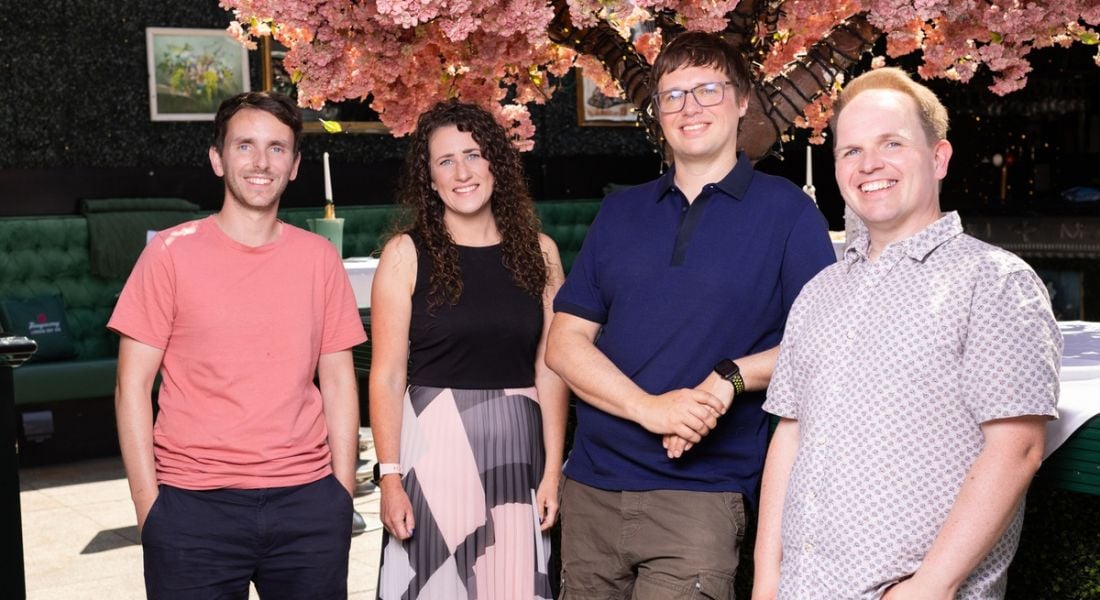Laura Haldane, VP of sales and marketing at SciLeads, gives an insight into the realities of career progression and how her company helps its workers achieve their goals.
As a company with less than 100 employees, Belfast-based SciLeads has an interesting – and pretty impressive – attitude to career progression and working culture. Founded in 2016, it provides market intelligence software to companies from the scientific and academic sectors.
It has always been remote and it is fully flexible, meaning its workers can self-determine a lot of what their working day looks like. Most of the company’s customer base is outside of Ireland so it doesn’t matter too much if staff don’t like the traditional nine-to-five hours. Earlier this year, SciLeads announced it was planning to double its workforce, with a view to hiring software, data, product and sales staff.
Steadily hiring through the years
According to Laura Haldane, one of a trio that co-founded SciLeads, the company has been steadily doubling its headcount over the past few years, “but no one really cared when it was doubling from five to 10,” she tells SiliconRepublic.com. Haldane’s department is marketing and sales, but having built SciLeads up from nothing alongside fellow co-founders Daniel McRitchie and James Campbell, she knows the tech side of the business very well.
A lot of her conversation is littered with references to the “dev team” and the engineers, as well as her own sales and marketing charges, whose careers she clearly cares a lot about. Since January’s hiring announcement, several more staff members have come on board. Three engineers started recently, but Haldane says they need up to five more. She adds that they also really need people to get the word out about SciLeads’ new product specifically for the pharma industry. (More on that later).
“It’s a bit more of a battle” hiring on the development side, but on the sales and marketing side, the company’s strategy so far has been to take “young bright things out of uni”. Haldane doesn’t really rate university degrees these days; she prefers to take people on and train them up. In terms of training, SciLeads is fairly open to going with the flow as these bright young things figure out what they want to do and where they want to go.
People passing through…
Haldane describes some of her colleagues’ and ex-colleagues career trajectories, naming them on a first-name basis only and telling me how they have developed since joining SciLeads. There is the former pharmacist who wanted to go into business and asked if he could start in a sales role to learn the ropes. He then decided he wanted to go into big software implementations and he managed SciLeads’ adoption of a new CRM platform, “and he just loved it,” says Haldane. In the middle of all that he moved to Perth from Dublin but is now going to return to Ireland to work for a company that does big software implementation full time. “He hasn’t actually left yet but we will miss him,” Haldane says, adding that he worked with the team for nearly three years. “If we could get more like him, it would be excellent”.
A lot of companies prefer to retain the staff they have invested time and training in, but SciLeads has a different perspective. As Haldane points out, “It’s very difficult when someone has finished a degree for them to know what to do because they have never seen a business, they don’t know what it’s like”.
“I had another girl that’s leaving us after three years, and she wants to do content writing. I’ve already got a content writer. We’re a small company so we don’t need 12 million content writers, so she’s got herself a brilliant job writing content. She came to us six months ago and said ‘Lads, I want to do marketing,’ and we said we already have a content writer and we don’t need another one, but I gave her blogs to write so that at least when she is in an interview she can say, ‘This is what I’ve done’. And that’s what she’s going to do, and I think that’s great.”
…and more people progressing internally
Not every young, ambitious employee leaves. Their head of European sales was hired as a college graduate. “It depends on what they decide they want their pathway to be. There are so many things that they can do here. It’s quite nice that they can sort of pick – and they can try … ”
Haldane thinks of another example of an employee who tried operations before finding she didn’t enjoy the data as much as she thought she would, so she went into sales. “People can change their mind as well when they’re young.”
How does a scaling company manage to accommodate the career interests of individual employees and put in the legwork required for revenue growth at the same time? Haldane reckons that bigger companies would have less ability to be flexible, which may well be the case. But big companies tend to have big revenues to match, so perhaps it has to do with management. Haldane says SciLeads’ hierarchy is “pretty flat” and that most workers are given about 80pc of their core role so they can spend the rest of the time working on or upskilling in other areas that interest them.
She says that when the company creates roles internally, which it has to do if one person’s role suddenly becomes too big – quite a common occurrence in a rapidly growing business – then that position is opened up to multiple graduates. This can help quieter employees who may be less likely to approach leadership and tell them want they want to do. As Haldane admits, “I tell them, though, that they need to shout because the people who do better with us are the people who say it.”
Sometimes she does have to put her foot down and tell overly-ambitious people to “pick a lane”. But overall she prefers it when workers say straight out what their goals are. If someone says they are fine, there are not a lot of things she and the rest of the company’s leaders can do other than remind them about opportunities internally.
Luckily, there have been plenty of chances for the dev team to get stuck in, particularly when they were building BioPharma, the company’s new product focusing on the pharma market. BioPharma gives clients data-based insights into companies operating in what is one of the most lucrative industries in the world.
A dispersed dev team building a single product
Following the product’s launch, Paddy McColgan, senior software developer at SciLeads, commented that it was great for his team to see the impact their work is having on sales. “Our BioPharma product has been a huge success … As part of a core team of seven developers, spread across the world, it has been an amazing experience to collaborate, entirely remotely, on such a big project.”
And he said that the team is still working on building it out and keeping it fresh. “We keep expanding the platform with huge new datasets and it pushes us to learn new skills and develop new processes.”
From a sales point of view, Haldane is delighted that the product is performing well in such a competitive market. Building it meant the tech team was using much bigger data sets than they were used to working with, and that required them to upskill, Haldane says.
“The way our dev teams are structured is the guys that have been here for a long time, know the most, and then the new guys tend to support them. And they wouldn’t have had the experience with such big datasets. So we’re still learning as we go. We haven’t hired a data scientist or a data engineer, which we probably should at some point, but for now the guys have just been upskilling.”
As long as they get the tools they need to build new tech and have learning resources at their disposal, the dev team is pretty happy, says Haldane. She thinks they have benefitted in particular from the flexibility that remote working offers because “they tend to just want to put the head down and get to work”.
“That product took about two years to build but not once did they meet up. Not once did they get in a room and whiteboard stuff. I just think that’s really cool.”
10 things you need to know direct to your inbox every weekday. Sign up for the Daily Brief, Silicon Republic’s digest of essential sci-tech news.




